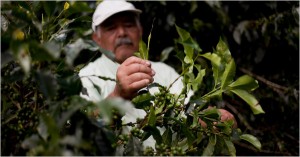 I’m a serious coffee drinker. But, admittedly, I know little about roasts, brews, or the land on which my beans are grown. Coffee is the U.S.’s largest food import, the second most valuable traded commodity only after oil. It’s also entangled in a complex web of issues involving human labor, the environment, climate change and international trade. I’ve been thinking more about these issues after reading a great post on Civil Eats and a recent New York Times article about Colombian coffee farmers (there’s a slideshow, too.) For the majority of small-scale coffee farmers in the developing world, the benefits of their hard work and economic investments are extremely limited. Rural farmers are isolated from global markets, and the long journey of a harvested coffee bean to the cup-o-Joe on your kitchen table is filled with powerful intermediaries.
I’m a serious coffee drinker. But, admittedly, I know little about roasts, brews, or the land on which my beans are grown. Coffee is the U.S.’s largest food import, the second most valuable traded commodity only after oil. It’s also entangled in a complex web of issues involving human labor, the environment, climate change and international trade. I’ve been thinking more about these issues after reading a great post on Civil Eats and a recent New York Times article about Colombian coffee farmers (there’s a slideshow, too.) For the majority of small-scale coffee farmers in the developing world, the benefits of their hard work and economic investments are extremely limited. Rural farmers are isolated from global markets, and the long journey of a harvested coffee bean to the cup-o-Joe on your kitchen table is filled with powerful intermediaries.
Consequently, very little of the money that we spend on coffee ever reaches the coffee farmers themselves. And with global warming and severe environmental degradation, especially in regions of Latin America, coffee farming is now even harder.
Libby Rosenthal of the New York Times writes:
“… In the last few years, coffee yields have plummeted here and in many of Latin America’s other premier coffee regions as a result of rising temperatures and more intense and unpredictable rains, phenomena that many scientists link partly to global warming. Coffee plants require the right mix of temperature, rainfall and spells of dryness for beans to ripen properly and maintain their taste. Coffee pests thrive in the warmer, wetter weather.
“… Agronomists are teaching the farmers how to control the pests that arrived with the change in the weather. Climatologists are working to provide better local weather predictions. Geneticists are breeding plants that are more resistant to diseases or that can withstand torrential rains or a hotter environment.”
Climate change continues to take a major toll on agriculture and livelihoods in the developing world and it’s up to us to do what we can to ensure that small-scale farmers reap the benefits of their labor. Last year, AJWS teamed up with Equal Exchange and formed Better Beans—an initiative to sell and distribute fairly traded, kosher coffee and chocolate. Better Beans products are produced by community-owned cooperatives that enable farmers to receive fair prices for their crops, access to affordable credit and an opportunity to engage in equitable long-term trade relationships. By choosing to buy fairly traded coffee, you can help build a global system that treats all producers equitably and embodies the Torah’s vision of a just society. So, start stirring your java with a bit of justice and place your Better Beans order today.
AJWS’s work in countries and communities changes over time, responding to the evolving needs of partner organizations and the people they serve. To learn where AJWS is supporting activists and social justice movements today, please see Where We Work.

